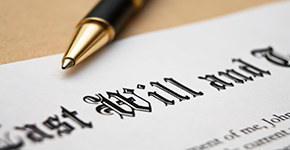Ten Misconceptions About Probate In Ireland
- Only one witness is needed to witness a Will being signed.
Incorrect – A Will must be signed by the Testator (the personal making the Will) in the presence of two witnesses.
- An Executor cannot receive a gift in a Will.
Incorrect – An executor is entitled to receive a gift in Will.
- There is no need to make a new Will after marriage.
Incorrect – Marriage invalidates an existing Will. Consequently a new Will must be drawn up and signed after a marriage.
- A witness to a Will can receive a gift in the Will.
Incorrect – A witness is not entitled to receive a bequest in a Will. If a person has witnessed a Will and is left a gift in that Will, the Will is not invalid but the witness is not entitled to receive the gift.
- No Inheritance Tax is paid by children who receive an inheritance from their parent in Will.
Incorrect – A child is entitled to receive an inheritance not exceeding €225,000.00 from their parent. The balance is taxed at a rate of 33% ( as at October 2014).
- If a deceased has no Will the assets are forfeited to the State.
Incorrect. If a person dies without making a Will, their estate goes to their next of kin. It is only if the next of kin cannot be traced that the assets are forfeited to the State.
- A valid Will cannot be challenged by children of the deceased.
Incorrect – A disappointed child is entitled to make a claim against the estate under Section 117 of the Succession Act, 1965 even if a valid Will has been made by their deceased parent.
- Every child should receive an equal share of their parent’s estate.
Incorrect. The law does not provide that a child is entitled to any specific share of their parent’s estate. However a disappointed child can bring a claim against a deceased parent’s estate under Section 117 of the Succession Act, 1965.
- A separated spouse is not entitled to challenge a Will.
Incorrect – This entirely depends on the terms of a Separation Agreement/ Judicial Separation. If the separated spouse have waived their Succession Act rights, there is no entitlement. However if not, they are entitled to a one third share of the estate (if there are children of the marriage) and a two thirds share if there are no children of the marriage.
- The surviving spouse / surviving civil partner must pay inheritance tax on an inheritance they receive from their spouse / civil partner.
Incorrect. There is no inheritance tax to be paid by the surviving spouse / civil partner.

